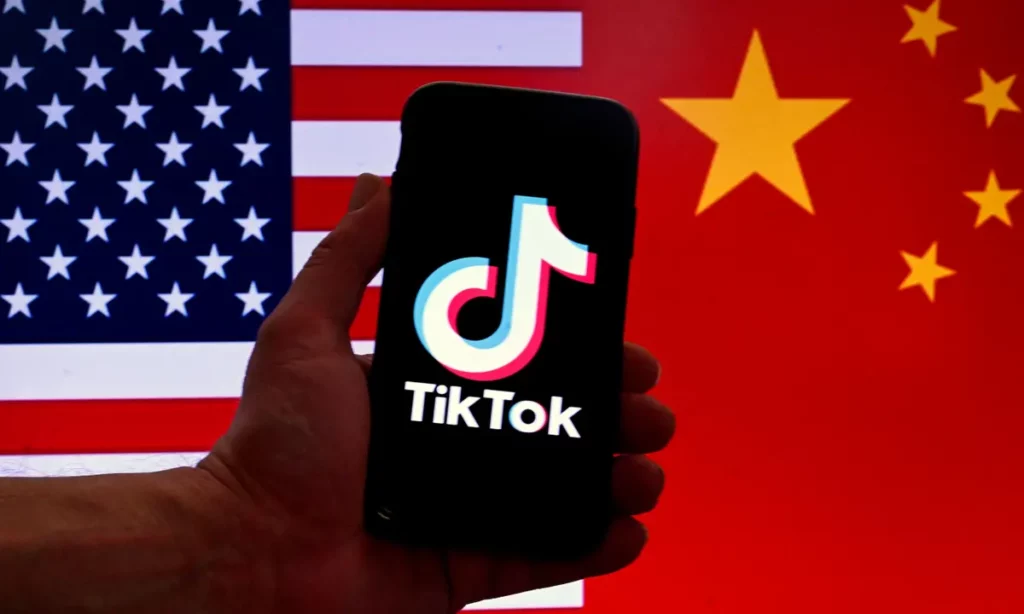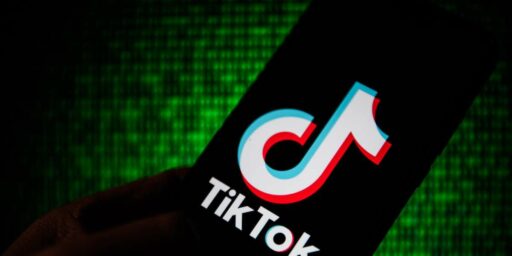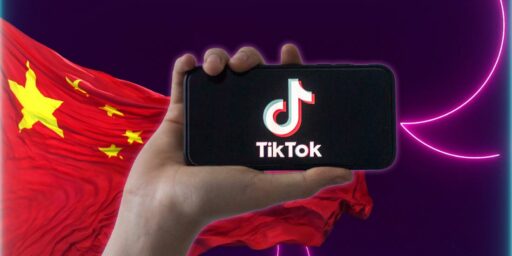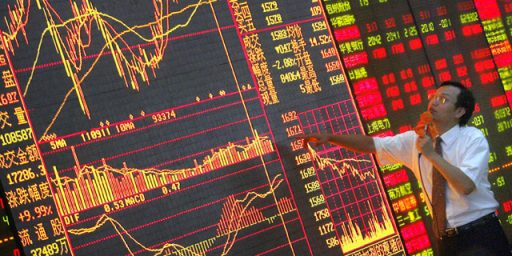TikTok Ban Close. Is it Constitutional?
The courts would likely allow restricting a Chinese data mining operation popular with American teenagers.

POLITICO (“An updated TikTok bill changes the game in Washington“):
A bill to potentially ban TikTok could be passed and signed into law as soon as next week, depending how quickly the Senate moves — which would mark a sharp ending to four years of attempts by two presidents to curtail the influence of the Chinese-linked app.
If President Joe Biden signs the bill as promised, it would mark an abrupt close to a frantic and high-powered pressure effort by the popular social media app to stop the bill. So far, the company’s efforts to deploy the clout of its users, including urging TikTokers to swamp lawmakers’ phones and bringing creators to Capitol Hill, have largely backfired.
A direct effort by Chinese diplomats to lobby Hill staffers, reported by POLITICO, instead only hardened the sense of Washington China hawks that the app was a dangerous proxy for Beijing.
With the House of Representatives set to pass the TikTok bill as part of a major aid package over the weekend, the ball would be in the Senate’s court, where friction already seems much lower than it was in March, when the TikTok bill first moved through the House.
If the bill passes, TikTok is then expected to shift its fight to the courts, arguing the law is unconstitutional, unfairly targeting a single company and violating the First Amendment.
[…]
The House’s TikTok bill was wrapped this week into a set of large aid and national security bills to support Ukraine, Israel and Taiwan, considered priority legislation for Senate Majority Leader Chuck Schumer. The House could approve the package and send it to the Senate as early as this weekend.
Already, Senate friction seems to be vanishing. Senate Commerce Committee Chair Maria Cantwell, who earlier had said the bill likely wouldn’t hold up in the courts, now says she supports the updated version. The original version had called for a forced sale within six months, and the new version extends that timeline up to a year.
“As I’ve said, extending the divestment period is necessary to ensure there is enough time for a new buyer to get a deal done,” Cantwell (D-Wash.) said this week. “I support this updated legislation.”
[…]
One potential sticking point: Sen. Rand Paul (R-Ky.), who has opposed the bill from the start as government overreach, and has First Amendment concerns for the 170 million Americans who could potentially lose access to the app. He also opposes the larger foreign aid package the bill is now attached to.
He could block the bills if they were brought up for an expedited unanimous consent vote or could filibuster them. To end a filibuster, Schumer would have to make a motion to invoke cloture, requiring 60 votes, to stop debate on the bill and bring it to a roll call vote.
Naturally, China is already retaliating:
In a sign of potential retaliation from a geopolitical rival, China reportedly ordered Apple to remove Meta’s WhatsApp and Threads from its app store Friday. While the move was largely symbolic — since both apps are already technically illegal in China — it hints that the door could be open for a wider crackdown on American companies.
I don’t have strong views on whether banning TikTok—or forcing its sale to a non-Chinese party—is good public policy. I’m skeptical of the alleged harm to national security. Still, they’re hardly without foundation.
Here’s what General Paul M. Nakasone, commander of U.S. Cyber Command and director of the National Security Agency, told Congress last April:
“If you consider one-third of the adult population receives their news from this app, one-sixth of our children are saying they’re constantly on this app, if you consider that there’s 150 million people every single day that are obviously touching this app, this provides a foreign nation a platform for information operations, a platform for surveillance, and a concern we have with regards to who controls that data.”
The danger is mostly theoretical but, certainly, the app has considerable reach. Rodman Ramezanian, Global Cloud Threat Lead at Skyhigh Security, contends “There’s Nothing Confusing About TikTok’s Security Risks.”
Nation states and security professionals alike are sounding the alarm. They see TikTok as significantly more risky than other apps, not only because of the quantity and type of data that it collects but also because of where that data is stored, what it could be used for, and who can ultimately access it.
[…]
According to its privacy policy, TikTok collects personally identifiable information (PII) that includes the user’s name, age, email, phone number, and social media account information. Additionally, it collects digital data, such as payment methods associated with transactions, social network contacts, IP addresses, geolocation data, and device information. And it collects biometric identifiers and biometric information, including faceprints and voiceprints from uploaded user content, as well as connected metadata.
[…]
Though TikTok denies that it would provide U.S. user data to the Chinese Communist Party (CCP), leaked audio from internal TikTok meetings show that U.S. user data has been repeatedly accessed from China, where ByteDance servers are located. Under China’s 2017 National Intelligence Law, TikTok, as a subsidiary of ByteDance, has a legal obligation to support CCP security and intelligence initiativesOpens a new window and could be compelled to exercise its access. Since the data is stored outside the U.S., American laws wouldn’t be enforceable, and TikTok would be in a position of policing itself.
[…]
In 2015, China announced its Digital Silk Road plan as part of its Belt and Road Initiative. The CCP sees data as a way to gain market advantage, power, and influence, as well as a way to develop machine learning models. The party went so far as to officially declare data as a national resource in 2019, on par with land, labor, capital, and technology.
It’s not a stretch to assert that the CCP could use its collected data sets for future applications and questionable purposes. A case in point is the former ByteDance executive who claimed that TikTok was being used by the CCP to spread propaganda and hateful content. He was promptly fired for misconduct and has since filed a wrongful termination complaint against ByteDance.
NYT national security reporter David E. Sanger argues “TikTok’s Security Threats Go Beyond the Scope of House Legislation.”
In the four years this battle has gone on, it has become clear that the security threat posed by TikTok has far less to do with who owns it than it does with who writes the code and algorithms that make TikTok tick.
Those algorithms, which guide how TikTok watches its users and feeds them more of what they want, are the magic sauce of an app that 170 million Americans now have on their phones. That’s half the country.
But TikTok doesn’t own those algorithms; they are developed by engineers who work for its Chinese parent company, ByteDance, which assembles the code in great secrecy in its software labs, in Beijing, Singapore and Mountain View, Calif. But China has issued regulations that appear designed to require government review before any of ByteDance’s algorithms could be licensed to outsiders. Few expect those licenses to be issued — meaning that selling TikTok to an American owner without the underlying code might be like selling a Ferrari without its famed engine.
[…]
No one was contemplating the possibility that Chinese engineers could design code that seemed to understand the mind-set of American consumers better than Americans did themselves. By the millions, Americans began to put Chinese-designed software, whose innards no one really understood, on their iPhones and Androids, first for dance videos, then for the memes and now for news.
It was the first piece of Chinese-designed consumer software to go wildly viral across the United States. No American firm seemed capable of displacing it. And so it wasn’t long before its ubiquity raised worries about whether the Chinese government could use the data TikTok collected to track the habits and tastes of American citizens. Panicked, state governments across the United States started banning the app from state-owned phones. So did the military.
But officials know they cannot wrest it from ordinary users — which is why the threat of banning TikTok, especially in an election year, is faintly ridiculous. In a fit of remarkable candor, Gina Raimondo, the commerce secretary, told Bloomberg last year that if any democracy thinks it can outright ban the app, “the politician in me thinks you’re going to literally lose every voter under 35, forever.”
Political impact and wisdom as public policy aside, I strongly suspect that it would survive judicial challenge. While there have only been a relative handful of big cases, the Supreme Court has recognized national security exceptions to the First Amendment for more than a century. The question will mostly be whether the severity of the restriction here is reasonable to mitigate the alleged risk. I would think the courts would defer to the judgment of elected policymakers in that regard.
That’s especially true, I would think, given that TikTik is a Chinese entity (owned by a company called ByteDance) and indirectly controlled (as with any large enterprise in the country) by the Chinese Communist Party. The restriction on the freedoms of US persons here is relatively minimal: there are plenty of other platforms for sharing memes.






Could you elaborate on that comment? The rest of the article seems to contradict it.
While this is objectively true, I think the feelings of resentment in the very many people who make the app a part of their daily lives at the moment would be hard to overstate. Their social networks would not magically reform intact on some new host app.
Without strong data privacy laws, and an enforcement mechanism, there is nothing to prevent China from just buying all the information anyway.
And China having a way to broadcast to all of American teenagers (not broadcast, exactly, but tweak algorithms to make sure they see videos about Foo) is no worse than Elon Musk doing that.
@Gustopher: Impressive Lefty Musk derangement to see as equivalent the focused direction of an unfriendly state actor (PRC under Xi Jinpig) and the erratic foolishness of a single entrepreneur – Musk. Something of a comic book level of analysis.
@DrDaveT: It’s theoretical in the sense that it’s not clear that the CCP is doing anything malign with the information. But the possibilities are certainly substantial.
@Gustopher: Musk isn’t our chief strategic competitor.
They’re banning breath mints now?
@Scott: I’ve been laughing at the typo in the headline every time I refresh the page. 😉
@James Joyner:
Given how Musk is dabbling in white supremacy and vaccine nonsense, he might be more dangerous. We’ve had more people in the US killed by antivaxxers than pseudo-communists in the past few decades at least.
I think there are things that aren’t being said here because it is classified. I think there is a very strong threat of some serious security issues. Unlike any other popular phone app, there is nobody who can be subpoenaed or regulated, or investigated by law enforcement/counter intelligence. Even a Euro app would have reciprocal agreements in place to keep an eye on it. TikTok has none of these.
In addition, some of TikTok’s practices aren’t so secret, just very shady. They spend heavily on promoting users that have potential. More than one might expect to be profitable. “secret sauce” is meaningless, here. The secret sauce is money.
An app like this can monitor phone calls and turn on the microphone – at any time. Most of them don’t. What do we know about TikTok? We know that the next update could start doing it. Or it could do it in random intervals, just to see who gets caught.
Any phone app can do this, however the rest of them are subject to investigation, regulation, law enforcement and counterintelligence.
The question foremost in my mind is what classified material is behind this?
@Gustopher: Musk is dangerous. Without debating who is more dangerous, just let me note that Musk/X/Twitter can be enjoined, raided and shut down. Musk can be arrested. Laws can be passed to alter the daily process of Twitter, and if it suspected of spying for a foreign power, its servers can be seized and examined.
None of those things are true of TikTok. AND, in my estimation, TikTok’s overlords are far more interested in doing that. Not that the Russians don’t have a foot in the door with Musk, because they pretty clearly do.
The CCP is the biggest censor on the planet and they are actively and effectively censoring American IP. They have no basis for objection to our banning their propaganda TikTool.
China’s current problems are the fault of Chairman Xi. He’s the one raising tensions in Taiwan and Philippines. He’s the one encouraging poor countries to fall into debt traps, and building up his military, and carrying on intellectual property theft and industrial espionage, and offering aid and comfort to Putin. It’s Xi’s policies that have cut foreign direct investment and his thuggish ‘diplomacy’ that has alienated much of the world, even Australia which depends on the Chinese market. He’s a very bad leader. Not as bad as Putin, that would take some work, but foolish.
I think it’s time to admit that the 34 year cold peace since the fall of the Berlin wall is over. Cold War 2 is well under way. In the first one we faced what we believed was an ascendent USSR, this time it’s China and it’s little dog, Vlad. We have a strong strategic advantage – we can choke off their oil, they can’t do the same to us. We have two oceans, but any Chinese ship that moves beyond their territorial waters moves at the sufferance of the US Navy. Geography is what it is.
@Jay L Gischer: There are far, far more problems with the behavior of social media and the use and export of data than the ownership of TikTok.
TikTok’s ownership is a silly distraction. There might not be somewhere to raid, but what’s the point of a raid when everything they are doing is legal? Put in tough data protection and privacy laws, and the regulatory framework to enforce them, and let the ownership work itself out.
@Gustopher: Well there’s an entertaining view into culty Left understanding of security risk. Citizen Musk making statements within the bounds of free speech unacceptable to Lefty culty political fractions is at the state security risk of a demonstrably hostile state power. You really are simply the photo-negative of the MAGA sympathisers to Putin, poo-pooing demonstrable state risk all because the opposition has disfavoured social opinions.
Musk is an unpleasant git, an erratic unpleasant git. He is not a security threat to the state.
(this is not to take a view on TikTok, other than it is annoying as a phenomena)
@Lounsbury: You’re a very dimwitted git.
The security threats that have been stated about TikTok exist irrespective of the owners, since there are no data privacy laws in the US.
Meanwhile, Musk propagates Russian propaganda, along with antivaxxer conspiracy theories and white supremacy at a fair clip, and his platform actively promotes these ideas. TikTok just doesn’t push these things the way Twitter does.
The threats of TikTok are hypothetical, while the threats of Musk are real.
Yes, Musk has free speech rights, but so do the Communist Chinese overlords of TikTok, so that’s a wash. Free speech in the US is not limited to citizens. It can also be weaponized and used to promote conspiracy theories, racist shit, etc, aimed at undermining the country — which Musk is a dim-witted accomplice of.
Strong data privacy laws, and making platforms responsible for their editorial decisions in promoting content would do far more to combat these threats than forcing TikTok to be sold to a different bunch of wealthy people with an agenda.
@Gustopher: doing sad parroting really hasn’t any panache at all.
The individual Musk making statements well within the bounds of normal discourse (stupid unpleasant statements) does not rise to the level of a threat to national security.
The fact you dislike him politically does not make him a “threat” in the sense of state security.
A “political threat” in the same way that the MAGA view you as a “threat” yes, but not a threat that a foreign power – notably one that has demonstrably shown a willingness and ability to utilise information warefare (as well as other more classic espionage tricks) – represents.
It resolves to being essentially the mirror image of MAGA in political terms, the domestic political opponent whose social mores and desires are different than yours is an Enemy and a Threat greater than a hostile foreign state actor – under the façade you are really no more democratic in instinct than they are, you have merely inverted the stances.
Now of course anyone so lacking in the basics of common
– there are of course no “free speech” rights obtaining for PRC as a state actor relative to American state security is simply inapplicable. The PRC overlords behind TikTok have precisely zero free speech rights in this.
@Lounsbury:
Ukraine is a national security matter. Musk interferes in the war there by suspending Starlink during Ukraine offensive operations. So he is not just some inconsequential doofus.
I’m not a fan. If citizens want to be stupid and give all their data to China, have at it. That’s on them.
It should be banned, though, on all government devices and networks.
@Lounsbury:
TikTok, the company, has free speech rights in the US. And thus, its owners do too. We have rather broader notions of free speech in the US than in Umpalumpaland or wherever you hail from.
Assume that the current owners of TikTok are bad actors. Forcing a sale to anyone else who is not in a list of three countries does not prevent it from being owned and operated by a bad actor, it simply specifies a single bad actor that cannot own it.
Regulate to the point that you are limiting bad actions, and you don’t have to worry about bad actors.
Is TikTok operated by that very nice man from Singapore who appeared before congress, or is it secretly operated by the PRC? I don’t care, and neither should our laws — regulate behavior, not ownership, and then no one has to care.
If there is a case to be made for TikTok being a particular national security threat that cannot be stopped by regulating behavior, because of its alleged ties to the PRC, that case has not been made. Facebook, Twitter and YouTube are all doing similar things, collecting similar data, and with much more active radicalization pipelines and propagation of disinformation campaigns.
The problem isn’t ownership, it’s what things are legal.
@William Teach: Depending on the security level of the site, I would expect all unapproved apps to be banned on government phones, and private phones in secure locations.
@Gustopher:
TikTok is banned on US government (and many state government) phones, and personal phones (and smartwatches) are prohibited in secure spaces.
The idea that Elon Musk is “more dangerous” than China is laughable, but I guess that’s become the zeitgeist in some circles.
@charontwo:
SpaceX and Starlink is one of the most important enablers for Ukraine in this war if not the most important enabler. The people on Twitter making claims about Musk cutting Ukraine off don’t really understand what is going on.
On the one hand, Musk and SpaceX is adhering to US law and US policy by not allowing the weaponization of Starlink by Ukraine. This is the same policy that puts limitations on how US weapons may be used.
Secondly, Starlink is inherently a commercial service and was never designed for military use. That means it has certain limitations when used in a military context. Many of the reports of Starlink getting “cut off” in Ukraine were actually terminals and accounts set up by donors in the West who stopped paying the bill or had other issues.
War on the Rocks had a podcast just this last week with the Assistant Secretary of Defense for Space Policy John Plumb and here’s what he had to say about issues with Starlink in Ukraine, and Russia illicitly acquiring Starlink terminals and using them near the frontline:
That part starts at around the 14:45 mark if anyone wants to listen.
SpaceX also has a government contract that expands and builds on Starlink called “Starshield” that will allow contracted service that doesn’t have the various technical limitations of the commercial Starlink service. Once this gets fully up and running, I would expect that commercial Starlink in Ukraine will likely be replaced by Starshield contracted by the US government.
Finally, it can’t really be underestimated just how important SpaceX currently is for US defense and national security both in terms of space launch capabilities but also satellite development and satellite constellations of various purposes. Starlink itself ameliorates a key and long-standing US vulnerability to Chinese and Russian anti-satellite weaponry and now China is scrambling to try to get its own LEO satellite network into orbit to compete. They are many years behind the curve, Amazon and OneWeb will have competing networks before China does.
So, the idea that Musk is a big threat to national security is countered by the facts on the ground.
At the height of the Cold War the U.S. didn’t ban Pravda or any number of Soviet propaganda publications. It would be a shame if, 60 years later, we have less respect for free speech now.